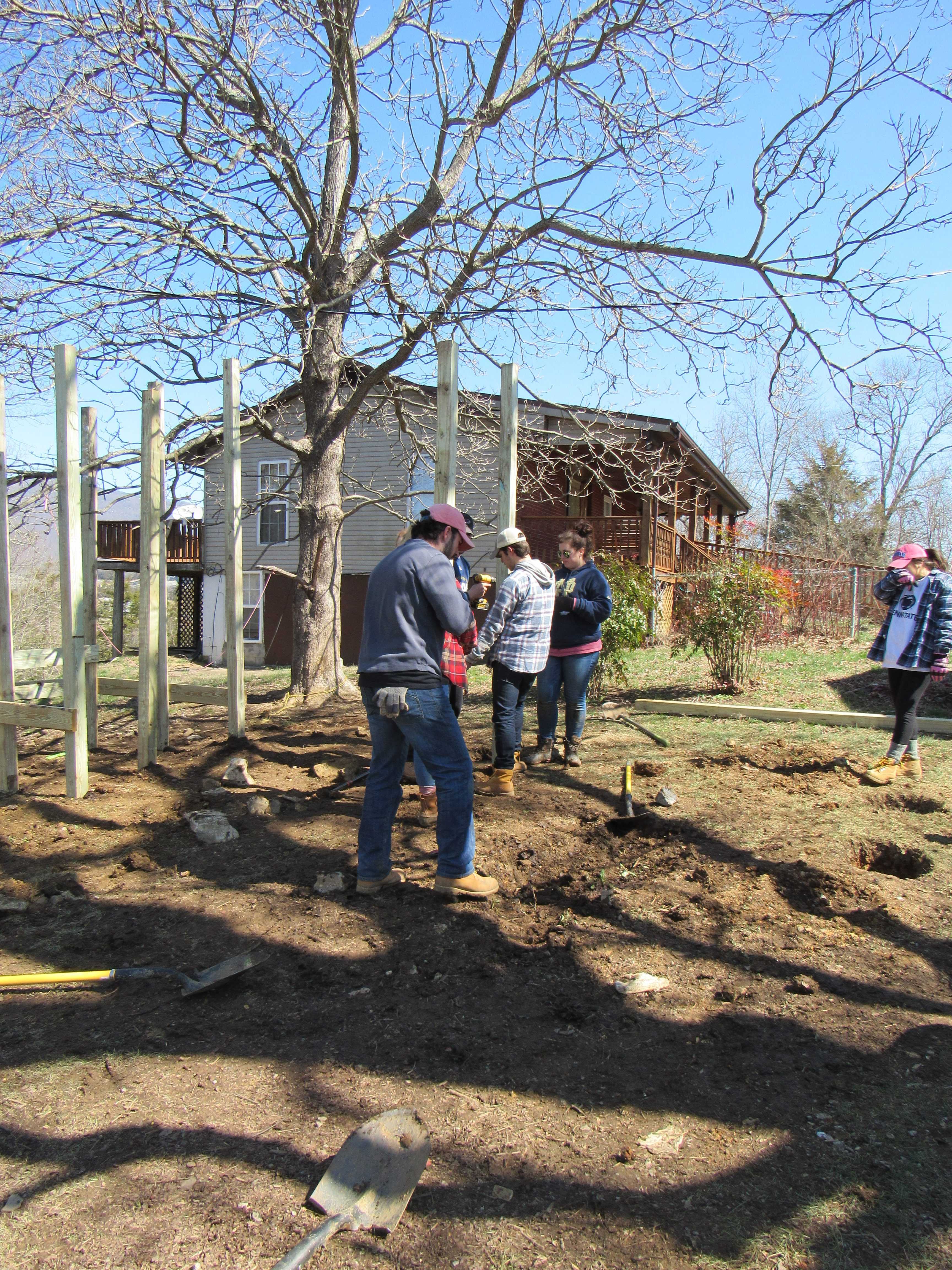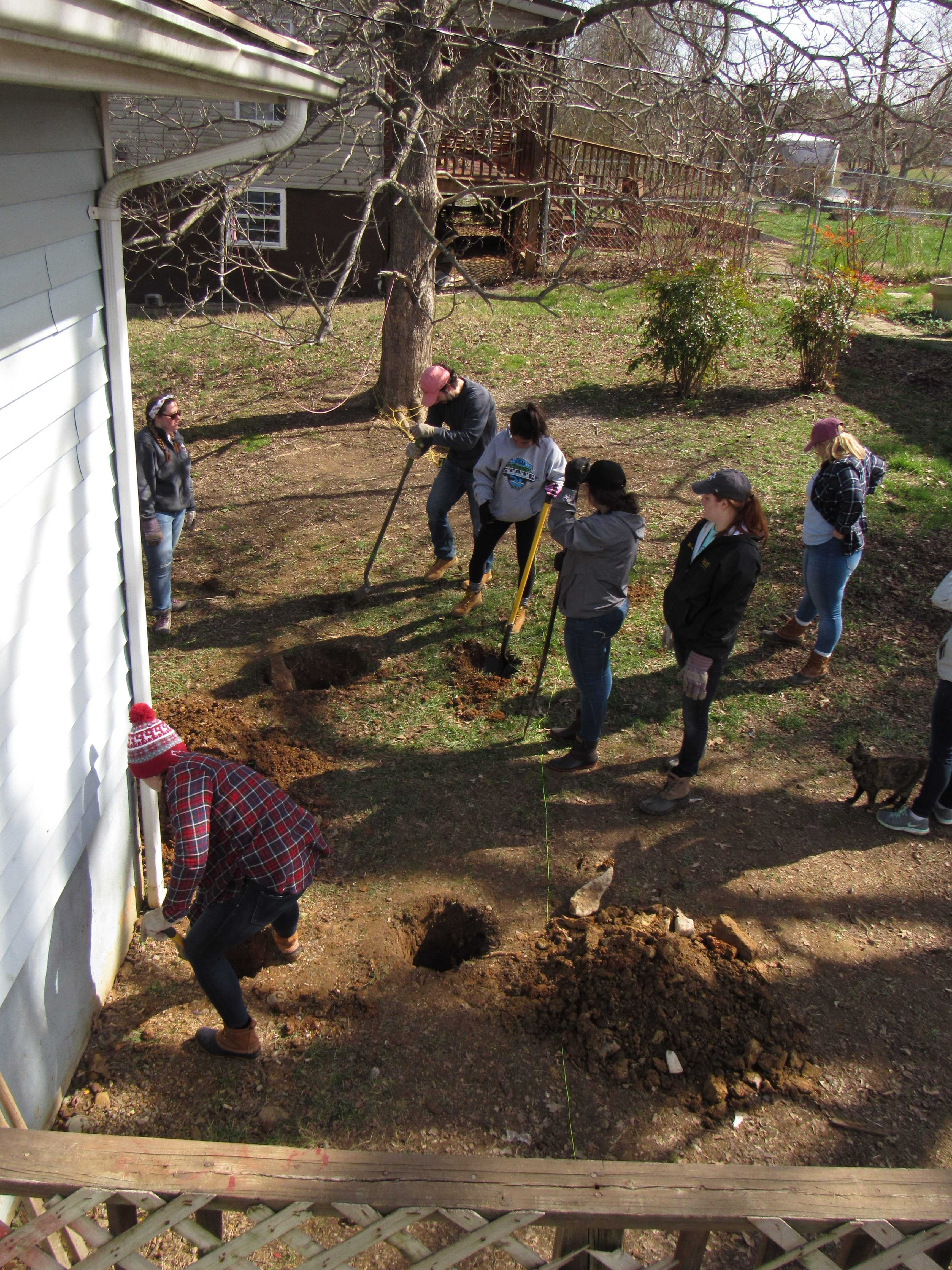APEX participants spend Spring Break in community
Over 500 Saint Joseph’s University students have returned from 17 separate trips to the Appalachian region over spring break. This year’s Appalachian Experience (APEX) brought St. Joe’s students face-to-face with communities affected by systemic injustice that are looking forward to changes from the Trump administration.
Tuesday’s Return Ceremony not only brought an atmosphere of love and strength but also one of reflection on the people, whose stories they strive to share from an area that believes it is forgotten by most of America.
“You see smiling faces, emotional expressions and reflections on the past week,” said Jackie Pignataro, ’17, one of the student coordinators for APEX and co-leader for the Guyan Valley, VA trip this year. “That can be derived from day one [when the leaders first met together last semester], an expression of the passion and love for the program, the common denominator of all the individuals coming together.”
Matt Fullmer, campus minister and program director, attributes the blissful atmosphere to the dedication and spirit that the 34 student-leaders brought  throughout planning and participation in the program. Working together, they secured a solid foundation and spirit that trickled down.
throughout planning and participation in the program. Working together, they secured a solid foundation and spirit that trickled down.
“It’s about fun but also about education, being in solidarity, and being reflective, coming together as a community,” Fullmer said.
The spring break immersion program works to cultivate a sense of community among St. Joe’s students, yet it also highlights a commitment to serve and learn about the Appalachian region. The program allows all of its participants to grasp the concepts of solidarity and social injustices that affect the people in the area. Participants enter the homes of whom they’re serving and have conversations, asking about their lives, being witness to what’s happening in Appalachia.
“A beautiful thing about APEX is that everyone is coming from different parts of their lives, whether or not they have a true, strong sense of understanding, of what social justice, what solidarity means,” Pignataro said. “One week is such a small time period but it does so much to everyone. At the end of it, we grow in understanding about others, about ourselves. We come to understand how we are together in all of this.”
First-time APEX leader, Sean Rigau, ’18, enjoyed planning the weekly meetings with his co-leader since he thought it was important for their group to prepare and get as much information as possible before arriving in Lantz Farm, WV.
“We talked a lot about social justice, compared with service and charity and also about the region in general,” Rigau said. “It’s important for the partici
pants to understand what they’re getting into. As long as you have an air of trust and love, everything falls into place.”
The APEX program found itself in an interesting position when the date of reveal happened on the Tuesday following the 2016 Election.
Fullmer believed that the program did not have to find a way to solve the issues of discomfort presented follows the election, but needed to recognize it.
“We were the first big gathering of students after the election,” Fullmer said. “We have to address this. It comes down to being human beings, welcoming people as who they are, not with any political affiliation. We’re going to the Appalachian region. There are beauty and struggles, just like in our neig
hborhood.’ Ultimately the goal is to get to know everyone at the core of who they are.”

(Photos by Kaitlyn Patterson ’20).
Instead of holding individual trip group meetings the last week in January, the program decided to invite Tom Breiding, a songwriter originally from Wheeling, WV and a coordinator for immersion trips for Wheeling Jesuit University to play for APEX participants in the chapel. That Tuesday evening, Breiding used his music as a vehicle to explain the hardships and the beauty of the Appalachian region, according to Fullmer.
“He [Tom] would take time between songs to explain its meaning and context, the reality of the situation the Appalachian people are in, the history of the region,” Rigau said.
Once in Guyan Valley, Pignataro’s group was exposed to perspectives participants never personally thought of. They were challenged to participate in conversations about their different views.
“Seeing the meaning of what the election has brought to the people in the Appalachian region, you grow in understanding,” Pignataro said. “Our goal as civic engaged citizens is to understand each perspective without judgment and to be open to each perspective and understand why it is [so].”
One of the key points of the APEX mission statement is recognizing the human dignity in all creation. Rigau emphasized to his group to break the perception o
f speration and truly recognize the similarities between the groups of people.
“You’re able to look at these people who are affected by systematic injustices due to business and certain industries in the area,” Rigau said.
Rigau was proud that his
group was able to understand the concept of giving service of presence during the week.
“Even though they weren’t building a house [doing] and hard manual labor [at times], they made an impact in a different way,” Rigau said. “I was lucky enough to see participants dive into the community and meeting people, no reservations about going with an open mind and heart,” he said.
Now back from the impactful experience, Fullmer hopes that the Return Ceremony will bring the participants’ energy home and serve as a powerful reflection of the past week.
“The hope is that we bring everyone back together and it’s up to us to make sure that energy is brought back and that it wasn’t fluff for a week,” Fullmer said.
Rigau also shares this sentiment.
“Obviously people take back stuff [as affirmation gifts] from the sites, but it’s the story behind everything that’s huge,” Rigau said. “Sharing those moments that spoke to you throughout the trip, are you doing what you just did [on APEX] justice? Being able to share those moments and stories does the program justice.













































